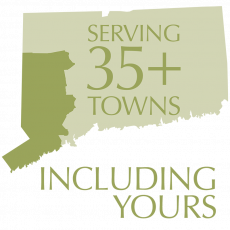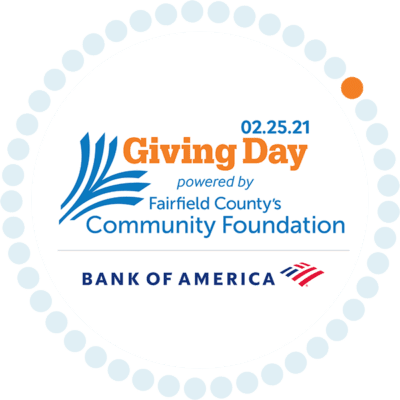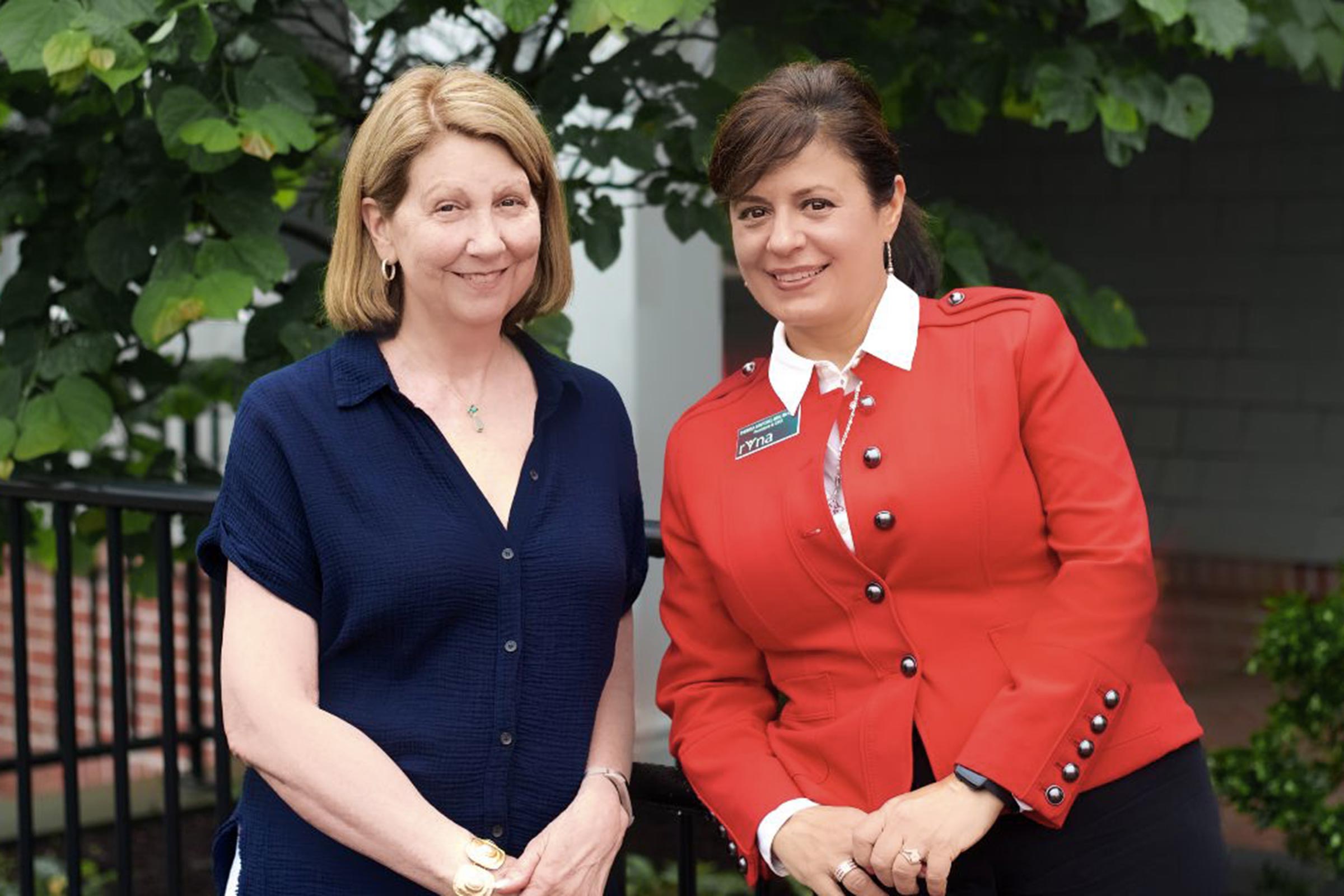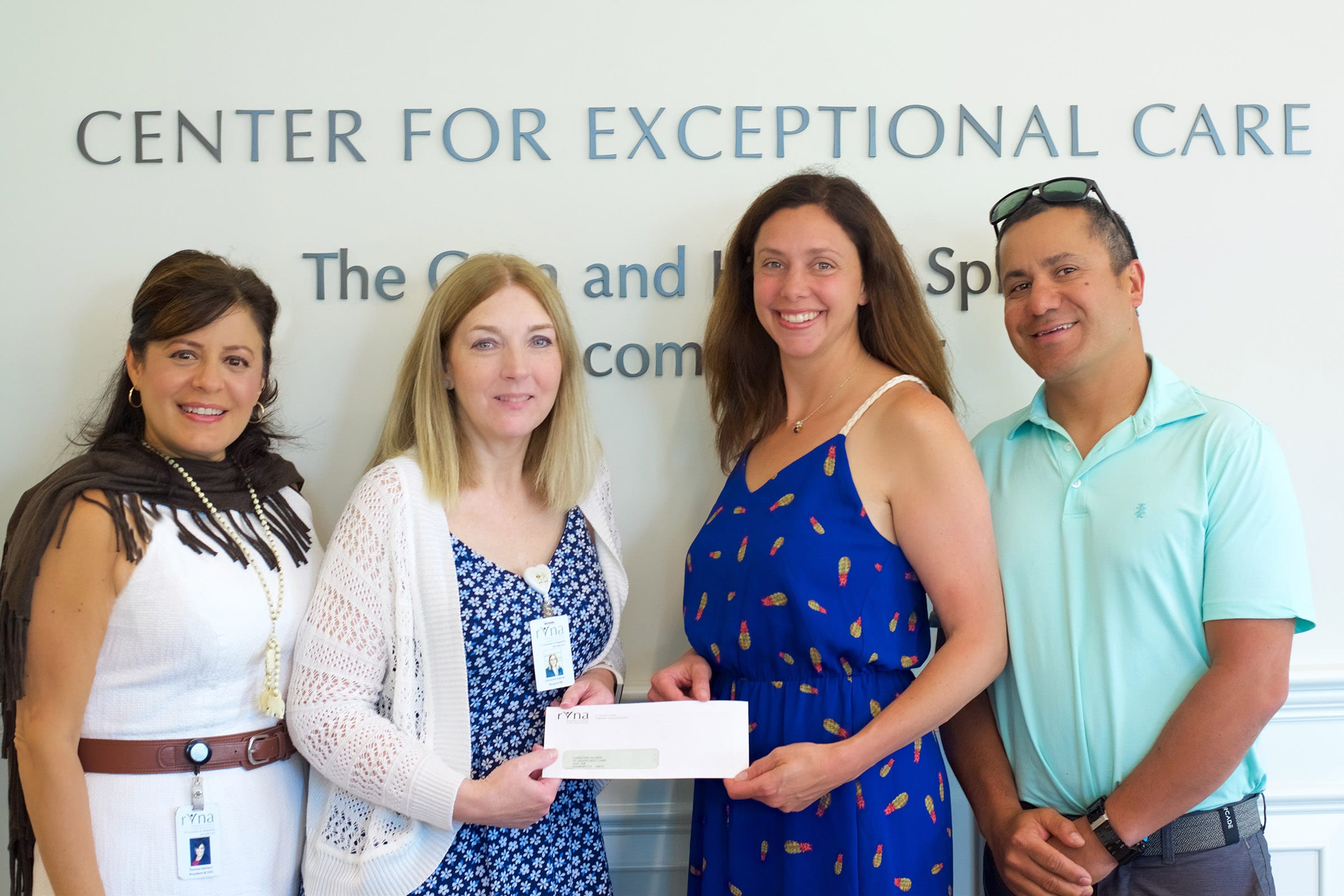RVNA Welcomes Board Members to New Term
Above: Eileen Walker, RVNA Board of Directors Chair (left) with RVNA President and CEO Theresa Santoro.
Dedication. Vision. Compassion. These are among the many traits that members of RVNA’s Board of Directors embody.
In July, RVNA said “Welcome!” to three new Board directors for the 2019-2020 term: Jill Bornstein, Joyce Ligi and Dean Miller.
Stepping down is Vicki Mueller, a longtime director and Finance Committee member. Though Mueller’s term expired in July, she will continue to stay engaged with RVNA as a member of the Finance Committee.
“We are grateful for the service, leadership and commitment that our current and past board members bring to RVNA,” says RVNA President and CEO Theresa Santoro. “We are proud of the impact that we have had on so many lives in the communities that we serve, and we look forward to continuing to bring health, care and wellness to individuals at all life stages.”
Meet the New Board Members
Jill Bornstein is the co-founder and CFO of Inspiring Comfort, a social-good company that aims to empower, teach and equip people of all ages, through skill-based learning, how to create compassionate connections. She previously served in senior finance roles at GE, on the board at buildOn, and as an elected Town Board of finance official for the Town of Ridgefield. Currently president at Tiger Hollow Inc., Bornstein has also been in leadership roles with Ridgefield Aquatic Club, Ridgefield Academy and Junior League.
Joyce Ligi first joined the RVNA Board of Directors in May 1978, and has served nearly continuously since then. She became Board Vice President in 1995, and was then President between 1997-2001. She again served as Vice President from 2013-2015. Ligi retired from Fairfield County Bank in 2010 as a Senior Vice President, Community Relations. She has volunteered with numerous area nonprofit organizations, including United Way, Danbury Hospital and Meals on Wheels.
Dean Miller is a retired financial executive who spent most of his career at GE Capital. He is currently the Board Chair and President at Meals on Wheels of Ridgefield, Connecticut, in addition to serving in Board Member and Treasurer roles with Thrown Stone Theatre Company and New England Auto Museum. Miller earned his CPA with a public accounting firm after graduating from Syracuse University with a bachelor’s degree in accounting.
To see the full list of RVNA Board of Directors members, visit the Management and Board of Directors page.
Elizabeth DeMassa Earns Marguerite Regan Nursing Award
From left, Theresa Santoro, RVNAhealth President & CEO; Scholarship recipient, Elizabeth DeMassa; MJ Heller, RVNAhealth Director of Philanthropy
There’s a saying, “When you’re a nurse, you know that every day you will touch a life or a life will touch yours.” That’s exactly what Elizabeth DeMassa is looking for as she heads to Moravian College in Bethlehem, PA this fall. DeMassa is entering the school’s nursing program having been awarded the Marguerite Regan Nursing Award by RVNAhealth last spring.
The award is a longtime, four-year partial scholarship, granted each year to a Ridgefield High School senior pursuing a bachelor’s degree in nursing. From RVNAhealth’s Board of Directors, a “scholarship task force” reviews anonymous submissions to select a recipient.
DeMassa, a graduate of Ridgefield High School’s class of 2019, selected nursing because she wants to work in a field where she can help others. Indeed, helping others seems to run in the DeMassa family. Her father, Douglas, is a chiropractor (and creator of Neuron-Do, which helps individuals develop motor and cognitive skills through martial arts), and her mother, Heather, is a nurse at Stamford Health.
On the extracurricular front, DeMassa was captain of the Ridgefield High School girls’ cross-country team last school year and a track and field standout. Meaning Moravian will benefit not only by her generous nature, but also her considerable athleticism.
Mind Those Curves!
Above: Students off to conquer the world!
With the 2019-20 school year in session, it’s time to pay attention to one big test that many students today face. You might be thinking about those pesky, annual standardized tests, or perhaps the SATs. But today we’re here to talk about posture.
“Kids’ postures are under constant assault these days,” says Gigi Weiss, MSPT, RVNAhealth’s Director of Rehabilitation. She points to a couple of culprits. First, the stuffed-to-the-gills backpacks that students often lug to, from and around school each day. Second, cell phones, which – when stared down at too much – can cause a painful condition known as “text neck.”
Misuse of these ubiquitous accessories places an enormous amount of stress on growing, developing bodies, and can eventually cause a slumping posture. A normal, healthy spine has an S-shaped curve,” says Weiss. “When you’re slumping, the spine has a C-shaped curve.”
Some signs that your child might need a better (or lighter) backpack or less time staring down at a cell phone include discomfort or pain in the neck, shoulder or lower back, or any combination of the above.
To help your child avoid getting text neck or a C-shaped curve, Weiss shares some recommendations:
Backpacks
- Should ideally be 10 percent, but never more than 15 percent, of body weight (for your 50-pounder, that’s just 5-7 pounds!).
- Straps should be on both shoulders and cinched tightly to the body.
- Heaviest items should be placed closest to the body.
Cell phones (this can be trickier!)
- Teach your kid to look down at the screen with their eyes, rather than bending the neck – or to hold the phone up closer to eye level.
- When you see hunching, encourage backward shoulder rolls: Shrug shoulders, extend shoulder blades toward each other…enjoy, repeat.
- Encourage daily physical activity (a win/win, compared to simply limiting device time)
To learn more about keeping your child’s S-curve in tiptop shape, contact the RVNAhealth team at 203-438-5555 or AskOurPT@rvnahealth.org.
RVNAhealth Announces Couri Nursing Education Scholarship Recipients
RVNAhealth is proud to announce Christine Palmer, RN, BSN and John Apinis, RN, as the inaugural recipients of the Couri Nursing Education Scholarship. The Couri Scholarship was established in January 2019 for the distinct purpose of supporting nursing education to benefit the individuals and communities served by RVNA, and to provide the opportunity for RVNAhealth clinicians to develop meaningful skills and advance as medical professionals.
Through the Couri family scholarship, Chris Palmer, RN, BSN, achieved her Bachelor of Science in Nursing this past May at Western Connecticut State University, graduating magna cum laude. Palmer is an RVNA Hospice nurse, delivering care and comfort to patients at this very important time of life. The Couri scholarship has enabled Palmer to expand her knowledge and further her educational goals. She plans to pursue her Master’s degree in the fall.
John Apinis, RN, is currently attending the Cleveland Clinic online to obtain his certification in advanced wound care. As the Director of Nursing at RVNA, Apinis oversees and trains the field nursing staff and provides care and education to patients in their homes.
“RVNA has enjoyed a special friendship and support from the Couri family for many years,” says Theresa Santoro, MSN, RN, CHCA, President and CEO, “and we are particularly grateful for this most recent gift. Education is the foundation for growth and progress and for performing our work at the highest level. The Couri Nursing Education Scholarship is not simply a gift to RVNA and our team, it is a gift to all those we treat. Its impact will touch many lives.”
Photo, left to right: Theresa Santoro, MSN, RN, and Chris Palmer, RN, of RVNA accept the Couri Nursing Education Scholarship gift from Megan and Chris Couri. Missing from photo: John Apinis, RN.
Health Fair: What’s Your Number?
Moonlighting at the RVNA Health Fair, Theresa Santoro, MSN, RN, President and CEO (at right), administered over 80 blood pressure (BP) screenings to attendees. As she observed, “It was very satisfying to see people so invested in their health and truly curious about what their numbers mean.”
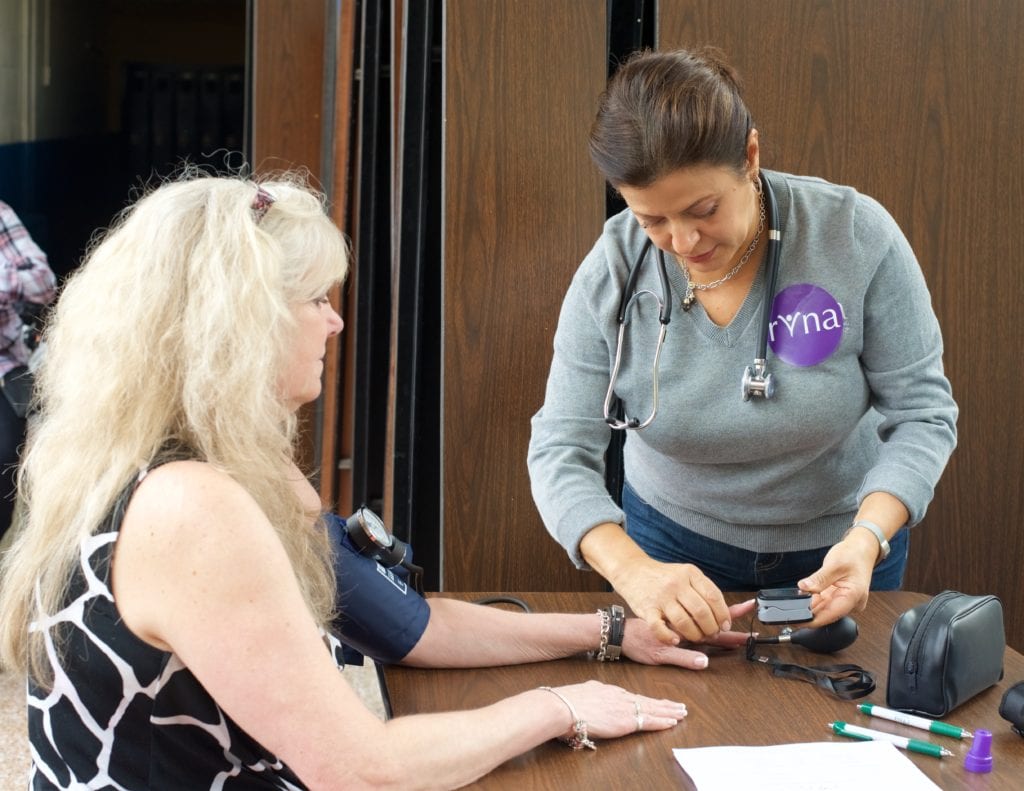

Which begs the question, what do those numbers mean anyway?
Blood pressure is recorded as two numbers, XX over YY. The first number, XX, is your systolic blood pressure. It indicates how much pressure your blood is exerting against your artery walls when your heart beats. The second number, YY, is your diastolic blood pressure. It indicates how much pressure your blood is exerting against your artery walls while your heart is resting between beats.
In “normal” blood pressure, the first number is less than 120 and the second number is less than 80. Numbers above these indicate ‘elevated’ or high blood pressure, depending on how high they are. Numbers below indicate low blood pressure.
It’s important to monitor your blood pressure regularly because high blood pressure typically has no obvious symptoms, yet it has clear risks. Namely, it causes damage to your circulatory system that is a significant contributing factor to heart attack, stroke and other health threats.
Having the Care Conversation
Planning ahead can be both exciting and satisfying, especially when it involves something you’re looking forward to, like a fabulous vacation or a good nap! At other times, however, it introduces topics that can be sensitive or difficult. Take, for example, the ‘care conversation.’
“The most important and helpful action that adult children can take is to talk candidly and honestly about care options, while their parents are still relatively healthy,” says Deirdre Sommerer, LPN, MS, RVNA’s Home Health Aide Supervisor. “The more that adult children understand about their parents’ wishes, the better prepared they will be to manage declining health, which oftentimes comes with complicated decisions. It’s the ‘not knowing’ that appears to burden adult children – they’re left with a tremendous responsibility to make decisions about health care and finances.”
While the lucky among us may not require care as we age, statistics suggest that most of us will need some level of help. As of 2010, the number of Americans age 85+ had reached 5.5 million and it’s the fastest growing age group of elders.
“The most important and helpful action that adult children can take is to talk candidly and honestly about care options, while their parents are still relatively healthy.”
Deirdre Sommerer, LPN, MS, RVNA
There are many resources that recommend topics to cover in a care conversation, including options and types of care; timing and preferences; legal and financial considerations; planning and preparing. “Having the care conversation empowers an individual to play a role in later decisions about their care and their life,” continues Sommerer, “and it empowers the family members who are responsible for overseeing their care. It’s a true gift to all parties.”
The following links provide helpful information on having the Care Conversation:

